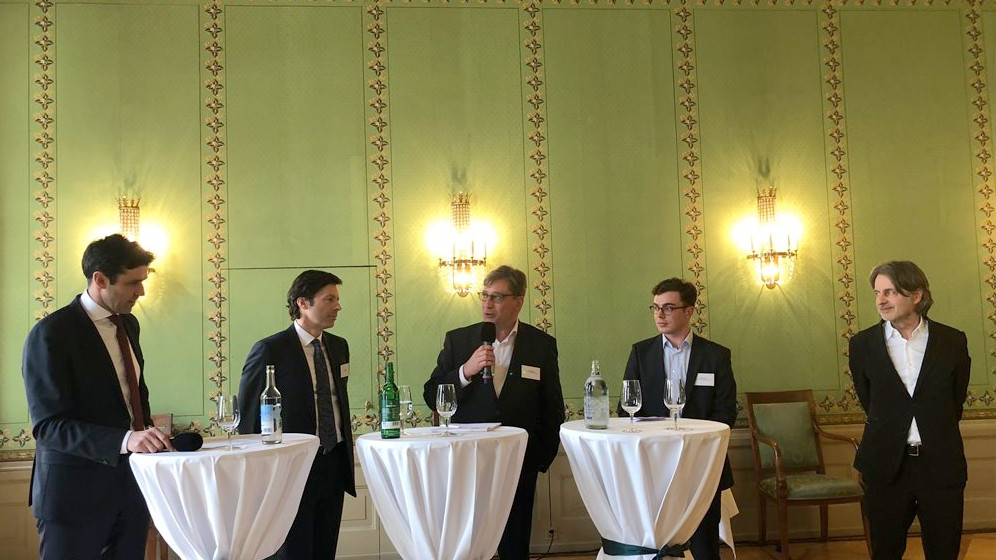The Swiss media landscape after the No Billag vote
Three days after the No Billag vote, representatives from politics, media, communications and the federal administration discussed the consequences of the initiative and the future media landscape in Switzerland at the traditional session event of the Parliamentary Group on Media and Communications (GMK) last week.

Since Sunday a week ago, the emotionally controversial vote on the No Billag initiative has been history. A vote that kept the whole of Switzerland spellbound for months and caused a stir far beyond its borders. What other country would allow itself to let its people decide on the financing of state broadcasting? Against this extraordinary backdrop, the Parliamentary Group Media and Communication (GMK) invited exponents of the referendum discussion to its traditional session event on March 7, 2018, to take stock of the situation.
EMEK Vice President urges more respect
Even though the decision was ultimately a clear "no" with more than 70 percent, the die is far from cast on the future of Switzerland as a media country. Various protagonists, including SRG, took a stand immediately after the vote and submitted new proposals for restrictions and financing. In her keynote speech, however, Silvia Egli von Matt, Vice President of the Federal Media Commission EMEK, called for a process of reflection in which a sustainable, diverse, high-quality Swiss media center should be considered together and the framework conditions should be defined wisely. However, the debate about No Billag was characterized by disrespect for other opinions, blanket suspicion and politically fueled mistrust. This is just as dangerous for democracy and our society as the lack of journalism.
The opinions are made (not yet)
After this assessment of the current situation, Frank Bodin, CEO of Havas Switzerland, Gilbert Bühler, CEO of Freiburger Nachrichten, Thomas Juch, Chairman of the Young Free Alliance and Co-President of No Billag, and OFCOM Director Philipp Metzger crossed blades. It became clear that despite the clear verdict, there is still a long way to go before a consensus can be reached. Gilbert Bühler, media entrepreneur and member of the Executive Board of the Swiss Media Association, welcomed the clear result as well as the SRG's announcement that it would cut back. At the same time, he made it clear that this was not the last word. There was still a need for corrections, he said, especially with regard to SRG's online offering and target-group-specific advertising; the latter was a no-go.
He received support on this issue from Thomas Juch. The No Billag initiator made it clear that the initiative committee would keep up the pressure on the reform process. He was quietly disappointed about the clear result, but also proud that for the first time they had been able to initiate a really well-founded discussion about the role of SRG.
The Swiss want a strong public service
From the point of view of the communications industry, on the other hand, Frank Bodin described it as naive to restrict SRG's advertising opportunities. A large part of the people would still appreciate and consume SRG's programs; advertising feels at home in such places. Moreover, it would not be the private providers that would benefit from a time restriction or a ban on target group-specific advertising, but the foreign advertising windows and the large global platforms such as Google and Facebook.
OFCOM Director Philipp Metzger indirectly supported him in this. The vote had shown that people wanted a strong public service. This makes it all the more important to continue the reform process that has been initiated. The draft concession in the new media law already demands a great deal from the SRG and does not grant it any new rights. On the contrary, its possibilities on the Internet would even be further restricted and texts without a picture or reference to its own broadcast would be banned.
At the end of the discussion, Co-President Filippo Lombardi called on the stakeholders not to leave everything to the regulator. The industry must also try to find a solution itself. A viable first step would be a round table. As the umbrella organization for commercial communication, Communication Switzerland is ideally suited for this, as it represents the common interests of all the important parties such as the Swiss Media Association, Admeira, Goldbach and the Swiss Private Radio Association (VSP).
Information and awareness
Yesterday, Wednesday, March 7, 2018, a good 40 representatives from the federal parliament, federal authorities, interest groups and the Federal Media Commission EMEK, as well as board members of the organizing associations Swiss Media and KS/CS Kommunikation Schweiz, met in the restaurant äusserer Stand in Bern. The aim of the Parliamentary Group on Media and Communication (GMK) is to inform and raise awareness among their parliamentary colleagues about political, legal, structural or economic developments that affect media freedom, media diversity and free communication.
The group is co-chaired by Council of States member Filippo Lombardi (CVP), National Council member Natalie Rickli (SVP) and National Council member Matthias Aebischer (SP).








